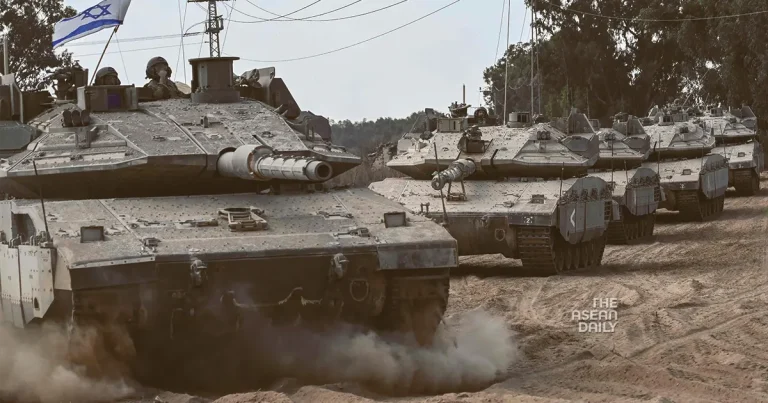12-3-2024 (GAZA) Escalating tensions in the Israeli-Palestinian conflict have cast a pall over the holy month of Ramadan, as Israel acknowledged on Monday that it had carried out an airstrike targeting a top Hamas military commander, potentially dealing a significant blow to the militant group’s leadership.
The Israeli Defense Forces (IDF) revealed that they had launched an attack on the Al-Nusseirat refugee camp in central Gaza on Saturday night, following intelligence about the location of Marwan Issa, the deputy military leader of Hamas’s armed wing, the Izz el-Deen al-Qassam Brigades.
Rear Admiral Daniel Hagari, an IDF spokesperson, stated during a briefing with reporters that the airstrike was a joint operation with Israel’s Shin Bet security service, targeting an underground compound used by Issa, known as the “Shadow Man” for his ability to evade detection, and another commander responsible for Hamas’s weapons stockpile in Gaza.
“Beside them in the tunnel there were other terrorists,” Hagari said, adding that while it was not yet certain whether Issa had been killed, his elimination would be a significant achievement for Israel’s military and intelligence agencies.
Chili Tropper, an Israeli cabinet minister, echoed the sentiment, describing Issa as Hamas’s “military chief of staff” and stating that his death, if confirmed, would be a “great achievement by the IDF and Shin Bet.”
Issa, along with Mohammed Deif, the commander of the al-Qassam Brigades, and Yahya Sinwar, Hamas’s Gaza leader, are among Israel’s most wanted individuals, having been implicated in the October 7th attack that triggered the current conflict. This assault, which left 1,200 people dead and 253 hostages taken according to Israeli tallies, sparked one of the bloodiest wars in the decades-long Israeli-Palestinian conflict.
Israel’s retaliatory military campaign on the densely populated Gaza Strip has claimed the lives of more than 31,000 Palestinians, according to Gaza authorities, while infrastructure has been obliterated, and hundreds of thousands are now on the brink of famine.
The reported targeting of Issa could further complicate efforts to secure a ceasefire and the release of hostages, although Israel maintains that talks are ongoing through Egyptian and Qatari mediators. Hamas, which governs Gaza, accuses Israel of refusing to provide guarantees to end the war and withdraw troops, while Israel insists it will not halt its operations until it has defeated the militant group.
Negotiators had hoped to achieve a halt in hostilities for the Muslim holy month of Ramadan, which began on Monday. However, these prospects appear to be fading as violence continues to escalate. An Israeli airstrike on a house in Gaza City killed 16 people and wounded several others, according to Palestinian health officials, while two Palestinians were also killed in an airstrike on a house in the southern city of Khan Younis as residents were breaking their Ramadan fast.
The IDF did not immediately comment on those incidents but stated that its forces had killed about 15 militants in close combat and airstrikes in central Gaza, and that commandos had targeted sites believed to be used by Hamas militants in Khan Younis.
The conflict’s ripple effects have also been felt beyond Gaza’s borders. Lebanon’s Hezbollah group claimed to have launched several drones at an Israeli outpost in the occupied Golan Heights on Monday, while two other incidents were reported in Red Sea waters, where Yemen’s Houthi rebels have been attacking ships.
At least one civilian was killed, and several others were injured after Israel launched four strikes on the eastern Lebanese city of Baalbek on Monday, according to security sources and the Baalbek governor, Bashir Khader. Israeli strikes, which have been primarily focused on the southern border region of Lebanon, have been edging further north in recent weeks, broadening the campaign’s scope, a Lebanese security source told Reuters.
Amid the escalating violence, United Nations Secretary-General Antonio Guterres appealed for a truce in Gaza, the release of hostages, and the removal of obstacles to life-saving aid. He warned that a threatened Israeli assault on the southern city of Rafah could plunge the people of Gaza into “an even deeper circle of hell.”
The dire humanitarian situation in Gaza has already displaced most of the 2.3 million residents, with many cramped into makeshift tents in Rafah, lacking access to food and basic medical supplies. The UN estimates that a quarter of the population is at risk of starvation, and aid agencies are struggling to meet daily needs, resorting to delivering aid by sea and through air drops.
Jordan, the US, Egypt, France, and Belgium have participated in humanitarian air drops, with Morocco also scheduled to join the effort, according to Israeli media reports. The US military said it had parachuted more than 27,600 meals and 25,900 bottles of water into northern Gaza, while a government source in Cyprus stated that a vessel carrying 200 tonnes of aid was scheduled to set sail on Monday. The US military vessel, the General Frank S. Besson, was also en route to provide humanitarian relief to Gaza by sea.
Basem Naim, a senior Hamas official, welcomed the aid corridor but urged the US to work towards ending the war, underscoring the complexity of the situation and the need for a lasting resolution to the conflict.




